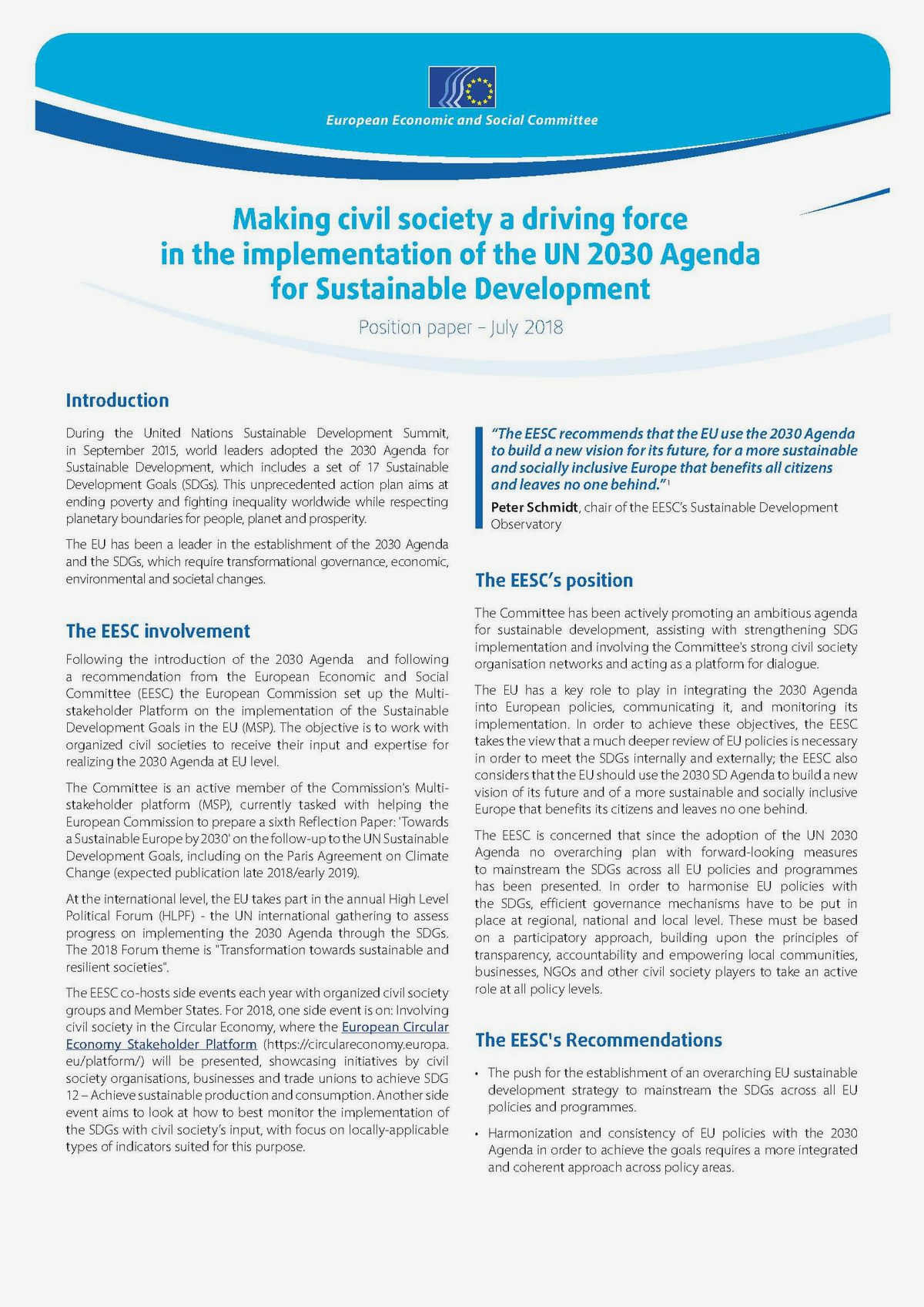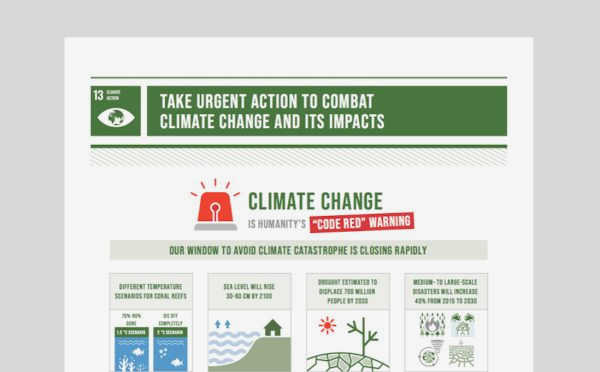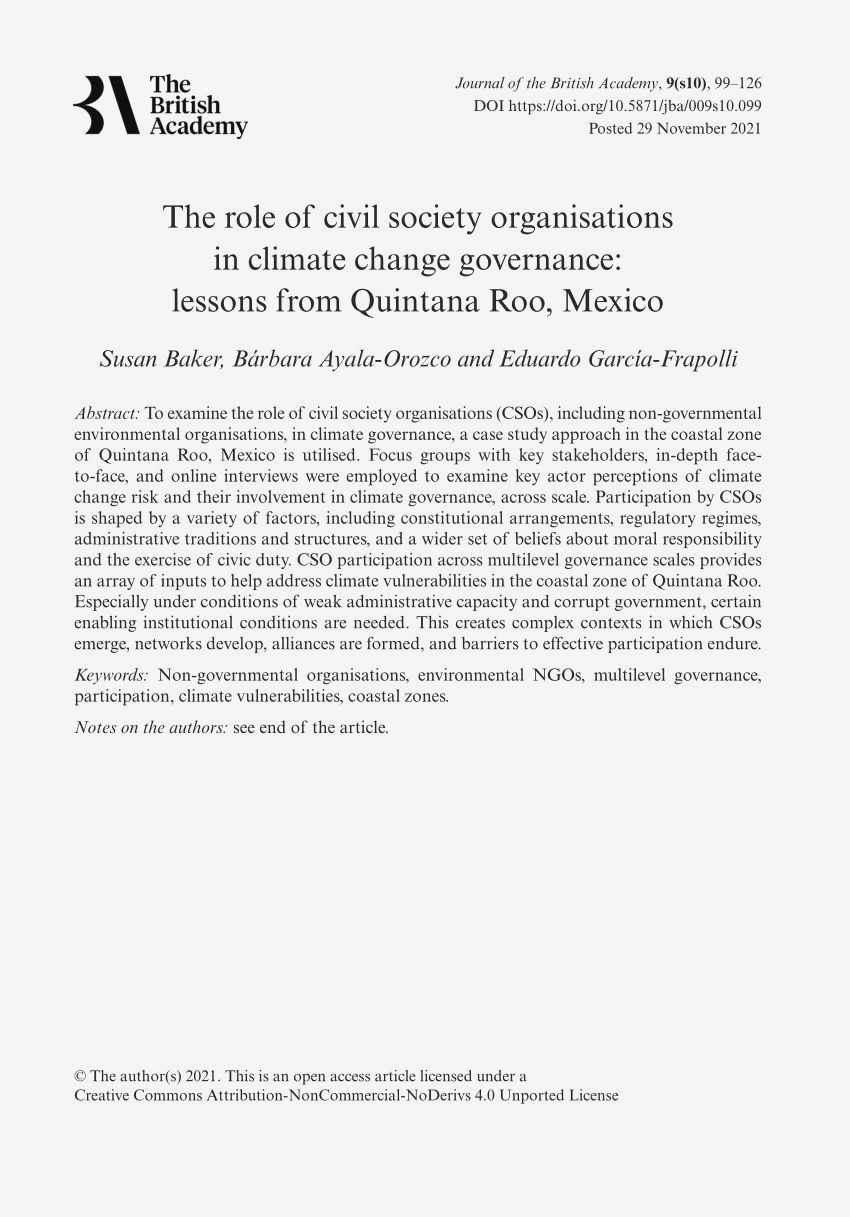Climate change continues to be one of the greatest challenges facing our planet today. As the Earth’s temperature rises and extreme weather events become more frequent, it is clear that urgent action is needed to mitigate the effects of climate change and build a sustainable future. While governments and international organizations play a crucial role in addressing this issue, the role of civil society cannot be understated.
Civil society refers to the organizations and groups that operate independently of the government and business sector, representing the interests and concerns of the general public. These include non-profit organizations, community groups, advocacy groups, and grassroots movements. It is through the collective efforts of civil society that real change can be achieved and a sustainable future can be built.
One of the key contributions of civil society in combating climate change is raising awareness and mobilizing public support. Through education campaigns, public events, and social media platforms, civil society organizations can engage with communities and individuals, helping them understand the urgency and magnitude of the climate crisis. By mobilizing public support, civil society can put pressure on governments and businesses to take action and implement policies and practices that reduce greenhouse gas emissions and promote sustainable development.
Understanding the Global Climate Crisis
The global climate crisis refers to the long-term changes in Earth’s climate system due to human activities, primarily the emission of greenhouse gases. These gases, such as carbon dioxide and methane, trap heat in the atmosphere and contribute to the warming of the planet.
Causes of the Global Climate Crisis:

- Burning of fossil fuels: The combustion of coal, oil, and natural gas releases carbon dioxide into the atmosphere, the main driver of global warming.
- Deforestation: The clearing of forests for agriculture, logging, and urbanization reduces the Earth’s capacity to absorb carbon dioxide, leading to increased greenhouse gas concentrations.
- Agricultural practices: The use of synthetic fertilizers and intensive farming methods contribute to the release of nitrous oxide, another potent greenhouse gas.
- Industrial processes: Various industrial activities, such as cement production and the manufacture of chemicals, release greenhouse gases into the atmosphere.
Impact of the Global Climate Crisis:

- Rising temperatures: The average global temperature has been increasing, resulting in heatwaves, droughts, and extreme weather events, which can threaten food security, water resources, and human health.
- Sea-level rise: As temperatures rise, glaciers and ice sheets melt, causing the sea level to rise. This poses a threat to coastal communities and ecosystems, leading to increased flooding and erosion.
- Loss of biodiversity: Changes in climate disrupt ecosystems, leading to the extinction of species and loss of biodiversity, which can have far-reaching ecological and economic consequences.
- Displacement of communities: Rising sea levels, extreme weather events, and changing agricultural conditions can force communities to relocate, leading to social and economic challenges.
The need for action:
The global climate crisis requires urgent action to mitigate its effects. This includes transitioning to renewable energy sources, implementing sustainable land-use practices, promoting energy efficiency, and adopting resilient infrastructure. Additionally, international cooperation, education, and awareness campaigns are crucial in mobilizing civil society and governments to combat climate change and build a sustainable future.

The Importance of Civil Society Engagement
Civil society plays a crucial role in combating climate change and building a sustainable future. It is essential for citizens to be actively engaged and empowered to take part in decision-making processes, as this promotes inclusivity, accountability, and transparency. Through active engagement, civil society organizations can bring diverse perspectives, expertise, and innovative solutions to the table.
Civil society’s involvement in climate change initiatives helps to ensure that the needs and concerns of communities are taken into account. It allows for the identification of vulnerable populations and the development of targeted strategies to address their specific challenges. By engaging with civil society, policymakers and government bodies can access valuable knowledge, resources, and grassroots networks that can strengthen their policy formulation and implementation processes.
Moreover, civil society engagement fosters public awareness and mobilization, creating a sense of urgency and collective action. Civil society organizations can serve as catalysts for change by raising public consciousness, organizing campaigns, and mobilizing communities to demand climate action from governments and corporations. Their advocacy efforts can generate public pressure, influencing policy decisions and encouraging stakeholders to take responsibility for their environmental impact.
Additionally, civil society engagement can help bridge the gap between global goals and local actions. By involving local communities in climate change initiatives, civil society can ensure that solutions are context-specific, culturally appropriate, and sustainable. Through community-based approaches, civil society organizations can empower individuals and support local initiatives that contribute to long-term environmental resilience.
In conclusion, civil society engagement in combating climate change is essential for building a sustainable future. By actively involving citizens, addressing their concerns, raising awareness, and mobilizing communities, civil society organizations can play a critical role in driving meaningful change and holding stakeholders accountable for their actions. Their contributions are instrumental in creating a more just, equitable, and environmentally conscious society.
Educating and Raising Awareness
Raising awareness about the impacts of climate change and the need for sustainable solutions is essential for combating this global issue. Civil society plays a crucial role in this process by educating individuals and communities about the causes and consequences of climate change through various means.
This education can take the form of workshops, trainings, and public forums where experts and activists share their knowledge and experiences. Civil society organizations can also develop educational materials, such as pamphlets, brochures, and online resources, to disseminate information about climate change to a wider audience.
Moreover, civil society can engage in awareness campaigns that utilize social media, websites, and other digital platforms to reach a larger population. These campaigns can raise awareness about the importance of sustainable practices, such as energy conservation, waste management, and eco-friendly transportation options.
By providing accurate and accessible information, civil society organizations can empower individuals to make informed choices that contribute to mitigating and adapting to climate change. Education and awareness-raising efforts can also foster a sense of urgency and responsibility among the general public, motivating them to support policies and initiatives that address climate change on a larger scale.
In addition to educating the public, civil society can also work with schools and educational institutions to integrate climate change awareness into curricula. By incorporating climate change topics into subjects like science, geography, and social studies, future generations can develop a deeper understanding of the issue and become environmentally conscious individuals.
Overall, educating and raising awareness about climate change is a vital step in building a sustainable future. Civil society organizations have a unique opportunity to leverage their knowledge, resources, and networks to reach a wide audience and inspire individuals to take action in combatting climate change.
Advocacy and Lobbying for Policy Change
Advocacy and lobbying play a crucial role in driving policy change and influencing decision-makers to take action on climate change. Civil society organizations have a unique position to advocate for policies that prioritize sustainability and combat environmental degradation.
Advocacy involves promoting specific policies, raising awareness, and mobilizing public support to influence policymakers. It entails conducting research, organizing campaigns, and engaging in public outreach activities to build a strong case for policy change. By presenting evidence-based arguments and highlighting the social, economic, and environmental benefits of sustainable practices, advocates can effectively communicate the urgency of addressing climate change.
Lobbying refers to the engagement with policymakers directly to influence their decisions and policies. Civil society organizations can lobby at different levels of government, including local, national, and international institutions. Lobbying efforts can range from one-on-one meetings with elected officials to participating in public consultations, writing policy briefs, and submitting recommendations for legislative reforms.
Through advocacy and lobbying, civil society organizations can:
- Educate policymakers about the importance of sustainable practices and the need for comprehensive climate change policies;
- Advocate for the integration of climate change considerations across various sectors, such as energy, transportation, agriculture, and industry;
- Push for the adoption of renewable energy sources and the reduction of greenhouse gas emissions;
- Encourage the implementation of climate adaptation and resilience measures;
- Highlight the benefits of sustainable development and green technologies for both the economy and the environment;
- Collaborate with other stakeholders, including businesses, academic institutions, and international organizations, to amplify the impact of advocacy efforts.
Efforts in advocacy and lobbying for policy change are vital in mobilizing political will and generating public support for addressing climate change. By influencing policymakers and shaping legislation, civil society organizations can contribute to building a sustainable future for all.
Encouraging Sustainable Practices
Sustainable practices are key in combatting climate change and building a sustainable future. Civil society plays a crucial role in encouraging and promoting these practices. One way civil society can do this is by raising awareness about the benefits of sustainable practices and the detrimental effects of unsustainable ones.
Education and advocacy are important tools that civil society can use to encourage sustainable practices. By organizing workshops, seminars, and awareness campaigns, civil society organizations can educate individuals about the importance of adopting sustainable practices in their daily lives. They can also advocate for policy changes that promote sustainability on a larger scale.
Collaboration with businesses
Civil society can also collaborate with businesses to encourage sustainable practices. By partnering with companies committed to sustainability, civil society organizations can promote eco-friendly products and services and advocate for sustainable production and consumption. This can include promoting renewable energy sources, reducing waste, and promoting recycling and circular economy principles.
Policy and regulation
Civil society can play a crucial role in influencing policy and regulation to encourage sustainable practices. By engaging in advocacy and lobbying efforts, civil society organizations can push for the implementation of policies that promote sustainability and hold governments and institutions accountable for their environmental impact. They can also work towards strengthening existing regulations and pushing for the adoption of stronger sustainability standards.
In conclusion, civil society has a vital role in encouraging sustainable practices. Through education, advocacy, collaboration with businesses, and policy and regulation efforts, civil society can drive positive change towards a sustainable future and help combat climate change. It is important for individuals and organizations alike to actively participate and support the efforts of civil society in promoting sustainability.
Fostering Innovation and Technology
In the global effort to combat climate change and build a sustainable future, fostering innovation and technology has become a crucial aspect. Civil society organizations play a significant role in driving innovation and promoting the adoption of sustainable technologies.
Promoting Research and Development: Civil society organizations can support and fund research and development projects that focus on addressing climate change challenges. By investing in innovative ideas and technologies, they can help accelerate the development of sustainable solutions.
Facilitating Collaboration: Civil society organizations can bring together different stakeholders, including scientists, engineers, entrepreneurs, and policymakers, to collaborate on finding innovative solutions to climate change. Through conferences, workshops, and partnerships, they can create a platform for exchanging knowledge and ideas.
Advocating for Policy Changes: Civil society organizations can advocate for policies that promote the use of sustainable technologies and incentivize innovation in the field. By working with policymakers, they can ensure that regulations and incentives are in place to support the development and adoption of clean technologies.
Supporting Start-ups and Entrepreneurs: Civil society organizations can provide financial support and mentoring to start-ups and entrepreneurs working on sustainable solutions. By empowering these innovators, they can help accelerate the commercialization and adoption of new technologies.
Monitoring and Evaluating Technology Implementation: Civil society organizations can play a critical role in monitoring the implementation of sustainable technologies and evaluating their impact. Through research and assessment, they can provide valuable feedback on the effectiveness of different technologies and identify areas for improvement.
Building Capacity: Civil society organizations can also invest in capacity-building initiatives to educate and train individuals and communities on sustainable technologies. By providing technical knowledge and skills, they can empower people to actively participate in the development and implementation of innovative solutions.
In conclusion, fostering innovation and technology is essential for combating climate change and building a sustainable future. Civil society organizations have a unique opportunity to drive innovation, facilitate collaboration, advocate for policy changes, support entrepreneurs, monitor technology implementation, and build capacity. Their contributions can help accelerate the transition to a more sustainable world.
Promoting International Cooperation
International cooperation plays a crucial role in combating climate change and building a sustainable future. With global challenges like climate change, no single country can effectively address the issue alone. It requires collaboration and coordination among nations to find collective solutions to this global problem.
Engaging in international agreements and protocols is one way civil society can promote international cooperation. Through agreements such as the Paris Agreement, countries commit to reducing greenhouse gas emissions and working towards a low-carbon future. Civil society organizations can play an important role in advocating for governments to join and adhere to these agreements, as well as monitoring their progress in meeting their commitments.
Facilitating knowledge sharing and technology transfer is another key aspect of promoting international cooperation. Civil society organizations can serve as intermediaries in sharing best practices, research, and innovative solutions across borders. By fostering collaboration and knowledge exchange, countries can learn from each other’s experiences and accelerate the implementation of sustainable solutions.
Building partnerships and networks is also essential for promoting international cooperation. Civil society organizations can facilitate dialogue and collaboration among governments, businesses, and other stakeholders. By bringing together diverse perspectives and expertise, partnerships can create synergies and leverage resources to implement effective climate action strategies.
Advocating for global funding and support is another important role civil society can play in promoting international cooperation. By advocating for increased financial resources and support for climate change mitigation and adaptation efforts, civil society organizations can help ensure that countries, especially developing ones, have the necessary resources to implement sustainable solutions and adapt to the impacts of climate change.
In conclusion, promoting international cooperation is vital in combating climate change and building a sustainable future. Civil society organizations have a crucial role to play in advocating for international agreements, facilitating knowledge sharing, building partnerships, and advocating for global funding and support. By working together, countries can effectively address this global challenge and create a more sustainable and resilient future for all.
Supporting Climate Change Adaptation Efforts
1. Raising Awareness and Education:
One crucial role that civil society plays in combating climate change is raising awareness and educating communities about the importance of climate change adaptation. Through workshops, seminars, and community outreach programs, civil society organizations can inform the public about the impacts of climate change and the need for adaptation strategies. They can also provide valuable information on sustainable practices, such as water conservation and energy efficiency, that individuals and communities can implement to adapt to changing climate conditions.
2. Advocacy and Policy Influence:
Civil society organizations have a unique ability to advocate for policies that support climate change adaptation. By conducting research, collecting data, and collaborating with experts, these organizations can influence policymakers to implement measures that promote resilience and adaptation. Whether it is advocating for the inclusion of climate adaptation strategies in national and international policies or pushing for the allocation of funding for adaptation projects, civil society plays a crucial role in shaping policies that address the challenges posed by climate change.
3. Supporting Vulnerable Communities:
Civil society organizations often work closely with vulnerable communities that are disproportionately impacted by climate change. These organizations provide support by helping communities develop and implement adaptation plans tailored to their specific needs and circumstances. They may assist in acquiring resources and funding for adaptation projects, facilitating capacity building and skills training, or providing technical assistance to address climate-related challenges. By engaging with affected communities, civil society organizations can empower them to become active participants in climate change adaptation and enhance their resilience to future climate impacts.
4. Encouraging Collaboration and Cooperation:
Civil society organizations can serve as a catalyst for collaboration and cooperation among various stakeholders involved in climate change adaptation efforts. They can bring together government agencies, businesses, academic institutions, and community groups to work towards common goals. By fostering partnerships and promoting multi-stakeholder dialogues, civil society organizations can facilitate the exchange of knowledge, experiences, and best practices, which are essential for developing effective climate change adaptation strategies. Cooperation among different actors can lead to more comprehensive and integrated approaches that address the complex challenges of climate change.
5. Monitoring and Evaluation:
Civil society organizations play a crucial role in monitoring and evaluating the effectiveness of climate change adaptation efforts. By collecting data, conducting assessments, and analyzing the impacts of adaptation initiatives, these organizations can provide valuable insights into what works and what needs improvement. This information can then be used to refine adaptation strategies, allocate resources more effectively, and ensure that adaptation efforts are achieving their intended goals. Through monitoring and evaluation, civil society organizations contribute to a continuous learning process that helps refine and enhance climate change adaptation practices.
Empowering Local Communities
Local communities play a crucial role in combating climate change and building a sustainable future. Empowering these communities is essential in order to harness their knowledge, skills, and resources to address the challenges posed by climate change.
Education and Awareness:
One way to empower local communities is through education and awareness programs. Providing them with information about climate change, its impacts, and potential solutions can help them understand the importance of taking action. This can be done through workshops, training sessions, and awareness campaigns.
Capacity Building:
Building the capacity of local communities is also crucial. This involves providing them with the skills, tools, and resources they need to adapt to and mitigate the effects of climate change. This can include training in sustainable farming practices, renewable energy technologies, and disaster preparedness.
Collaboration and Networking:
Creating networks and fostering collaboration between local communities is another important aspect of empowering them. By connecting communities that face similar challenges, they can share knowledge and experiences, and collectively work towards finding solutions. This can be done through the establishment of community forums, platforms, and online networks.
Promoting Sustainable Practices:
Empowering local communities also means promoting sustainable practices. This can involve encouraging the use of renewable energy sources, promoting waste reduction and recycling, and supporting sustainable agriculture and forestry practices. Providing incentives and support for these practices can help motivate communities to take action.
Inclusion and Participation:
Finally, empowering local communities means ensuring their inclusion and active participation in decision-making processes. Their voices should be heard and their perspectives taken into account when formulating policies and implementing initiatives related to climate change. Local communities have valuable knowledge and insights that can contribute to more effective and sustainable solutions.
In conclusion, empowering local communities is essential in the fight against climate change. By providing education, building capacity, fostering collaboration, promoting sustainable practices, and ensuring inclusion and participation, we can harness the potential of these communities and create a more sustainable future.

The Road Ahead: Building a Sustainable Future
As the threat of climate change becomes increasingly urgent, it is crucial that we take immediate action to build a sustainable future. This will require the collaboration and efforts of various stakeholders, including governments, businesses, and civil society organizations.
Civil society has a vital role to play in this endeavor. It is through the collective action and advocacy of civil society organizations that meaningful change can be achieved. These organizations have the ability to raise awareness, mobilize communities, and hold governments and businesses accountable for their actions (or lack thereof) in combating climate change.
One of the key areas where civil society can contribute is in promoting renewable energy sources. By advocating for the adoption of renewable energy technologies such as solar and wind power, civil society organizations can help reduce reliance on fossil fuels, which are a major contributor to greenhouse gas emissions.
Another important role of civil society is in promoting sustainable consumption and production patterns. By encouraging individuals and communities to adopt more sustainable lifestyles, civil society organizations can help reduce the overall carbon footprint and minimize the impact on the environment.
Fostering partnerships and collaboration between civil society organizations, governments, and businesses is crucial. By working together, these stakeholders can pool their resources, expertise, and influence to develop and implement effective climate change mitigation strategies and policies.
Furthermore, civil society organizations can also play a key role in holding governments and businesses accountable for their climate commitments. By monitoring and reporting on their actions, civil society can ensure transparency and encourage greater accountability in the fight against climate change.
In conclusion, the road ahead in building a sustainable future requires the active involvement of civil society organizations. Through their efforts in promoting renewable energy, sustainable consumption, and fostering partnerships, civil society can contribute significantly to the global efforts in combating climate change and ensuring a more sustainable future for all.





